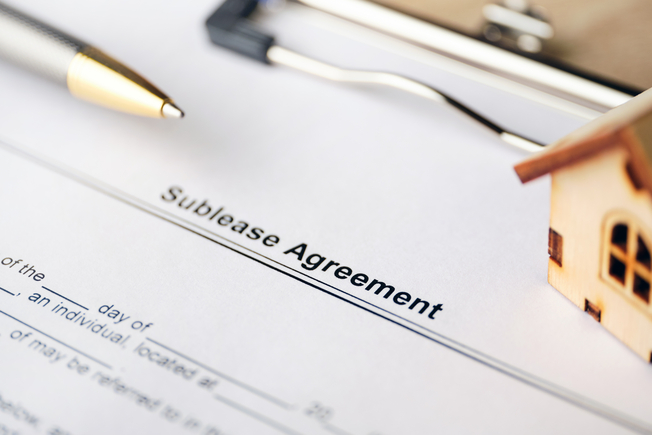
What is a Guarantor and Who Needs One?
If and when a renter needs a guarantor depends on several factors, including credit score, credit history, and income, to name just a few. For first-time renters early in their careers, it is not uncommon to need a guarantor to get their rental application approved for a new apartment. In this article, we'll explain everything you need to know about guarantors, from how to determine whether you’ll need a lease guarantor to who you should ask to be your guarantor if necessary.
What is a guarantor?
A guarantor is an individual who signs a lease guaranteeing that they'll cover any rental fees the tenant is unable to pay. They sign the apartment lease along with the tenant, much like a co-signer does for a loan. Their signature gives the landlord or property manager reassurance if they have concerns about the tenant's ability to make their rent payments due to low credit score, low salary, or other red flags. So, if a tenant falls behind on a few month’s rent, it will be up to the guarantor to foot the bill.
What is the difference between a guarantor and a co-signer?
When it comes to renting an apartment, many people use the words guarantor and co-signer interchangeably. Technically, they aren't the same.
For example, if someone is a lease guarantor, they assume financial responsibility without occupying the rental unit. A person who is co-signing is a second signer on the lease agreement, assumes financial responsibility on behalf of the tenant, and can inhabit the rental unit.
Both typically have higher credit, are employed, and can guarantee to the landlord that they can make rent payments on the tenant’s behalf.
Do I need an apartment guarantor?
If tenants have bad credit (or no credit rating), they can expect the landlord to require them to have an apartment guarantor on their lease agreement. Another reason could be that the tenant doesn't earn enough money to cover the rent. Many tenants ask someone to be their guarantor if they fall slightly shy of the landlord's requirements for their rental property.
Other reasons you might need a guarantor include:
- If there's a bankruptcy or other red flags on your credit report. Keep in mind that red flags during a credit check also include limited credit history, making it challenging to convince landlords that you can pay rent on time.
- If there's an eviction in your rental history. Evictions can stay on your credit history for up to seven years, making it difficult to secure future rentals (especially if you plan to live alone).
- If you have gaps in your employment history. Landlords want to see consistent income — and if there are gaps in your employment, that makes it difficult to convince them of your ability to pay on time every month.
- If your proof of income doesn't satisfy the landlord's requirements. Your income might be low compared to the amount of monthly rent that you say you can pay. Even though you know you can make these payments, landlords want to see that you earn at least three times as much as they charge for rent.
How should I pick an apartment guarantor?
Picking a guarantor is a big decision because, when you ask someone to do this, they're putting their credit and finances on the line on your behalf. Start by examining your finances to determine if you can pay the rent. A guarantor is not a money lender, and in an ideal world, you will not need to ask them to make payments on your behalf. So, assure your guarantor that you won’t risk putting them in a tight financial position.
Picking an apartment guarantor might be challenging for some due to the requirements. For example, these individuals must have good credit, be financially stable, be responsible, and be trustworthy. Suggestions for who to ask could include close friends, family members, or others with whom you have a strong relationship.
Requirements for a guarantor:
- Individuals must have state-issued identification and be at least 21 years or older.
- Guarantors must have good financial stability.
- The guarantor must have a good credit history.
- This individual must have a separate bank account from the tenant.
- They must furnish financial documents, including bank statements, pay stubs, and tax returns.
What is the responsibility of a guarantor?
A guarantor's signature on a lease means they legally agree to make payments if the tenant defaults. That means an apartment guarantor is responsible for taking over rental payments if the tenant cannot cover those expenses themselves. This financial obligation also extends to damages that occur in the rental unit if the tenant fails to cover them.
Can I have more than one guarantor on a lease? Why would I need more than one guarantor?
Young roommates often need more than one guarantor. This situation is most common when recent college graduates plan to live together in an apartment as roommates, but haven't had enough time to establish credit or secure employment.
It’s also possible that one guarantor won’t quite meet the landlord's requirements. For example, in some rental markets, like New York City, a renter may be asked to show that they earn 40 times the monthly rent in a year. If neither the renter nor their one guarantor can meet that requirement alone, the landlord might accept more than one guarantor on the lease.
Why would I want a guarantor if I don’t need one?
If you're worried about getting approved for an apartment or losing the apartment to a stronger applicant, you may want to consider getting a guarantor on a lease even if you technically don't need one. In a competitive real estate market, an apartment guarantor sets your application apart even more than glowing references.
Suppose you’re a first-time renter with decent credit, but you just barely meet the landlord's rental requirements. In that case, it might be a good idea to get a guarantor to put the landlord’s mind at ease and help separate you from other more qualified applicants. Even if you have consistent income and good credit, you may be competing against dozens of other applicants who have the same qualifications. A guarantor could tip the scales in your favor.
What should I do if I can’t find a guarantor?
If you don't have a close friend or family member who can be your guarantor, here are some other lease guarantor options you can consider:
- Guarantor services: Many companies work with renters by stepping in as their co-signer or guarantor and typically charge up to 85% of the monthly rent.
- A month-to-month lease: Instead of locking into a lease, the landlord might agree to a month-to-month rental agreement at a slightly higher rate if you fall slightly shy of their requirements.
- A roommate: It might be easier financially to build your credit and show that you can pay rent on time if you have a roommate — especially if they're willing to be a co-signer on the rental agreement.
- Section 8 housing apartments in your area: If you have low income, you might qualify for a Section 8 housing voucher or other government-subsidized housing programs. These vouchers act as a guarantee that rental payments occur on time.
Bottom Line
You'll find that some landlords and property managers are more willing to work out rental agreements than others. The situation depends on the rental fees, your history, and how the application process goes, not to mention how hot the market is. If you meet the landlord's requirements, you might not need a guarantor.
However, before getting your heart set on an apartment, it would be best to scrutinize your finances to ensure you can make the rental payments and are likely to meet a landlord’s expectations. If you find that you fall short of the rental requirements — like if you have poor credit or an income lower than three times the rent price — your apartment search should go hand in hand with a search for a guarantor.
Top cities
Atlanta Apartments
1,999 apartments starting at $600/month
Austin Apartments
4,949 apartments starting at $600/month
Baltimore Apartments
1,472 apartments starting at $500/month
Boston Apartments
3,499 apartments starting at $940/month
Charlotte Apartments
2,903 apartments starting at $450/month
Chicago Apartments
4,012 apartments starting at $450/month
Dallas Apartments
5,609 apartments starting at $604/month
Fort Worth Apartments
2,193 apartments starting at $600/month
Houston Apartments
4,504 apartments starting at $590/month
Las Vegas Apartments
1,081 apartments starting at $704/month
Los Angeles Apartments
11,535 apartments starting at $625/month
Miami Apartments
544 apartments starting at $1,000/month
Milwaukee Apartments
928 apartments starting at $465/month
New York Apartments
4,118 apartments starting at $488/month
Oakland Apartments
608 apartments starting at $885/month
Orlando Apartments
842 apartments starting at $825/month
Philadelphia Apartments
3,657 apartments starting at $550/month
Phoenix Apartments
4,153 apartments starting at $599/month
Pittsburgh Apartments
1,223 apartments starting at $600/month
Portland Apartments
2,519 apartments starting at $599/month
Raleigh Apartments
1,367 apartments starting at $750/month
San Antonio Apartments
3,925 apartments starting at $525/month
San Diego Apartments
2,960 apartments starting at $650/month
San Francisco Apartments
436 apartments starting at $675/month
San Jose Apartments
405 apartments starting at $1,300/month
Seattle Apartments
3,623 apartments starting at $450/month
Tampa Apartments
1,078 apartments starting at $800/month
Washington DC Apartments
2,878 apartments starting at $745/month


